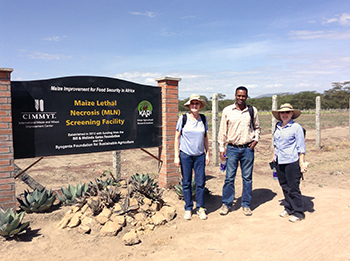Latest News Archive
Please select Category, Year, and then Month to display items
01 February 2024
|
Story Lacea Loader
|
Photo SUPPLIED
 Prof Prince Ngobeni, newly appointed Campus Principal of the UFS Qwaqwa Campus.
Prof Prince Ngobeni, newly appointed Campus Principal of the UFS Qwaqwa Campus.
The University of the Free State (UFS) has appointed Prof Prince Ngobeni as Principal of the Qwaqwa Campus as from 1 February 2024.
Prof Ngobeni completed his first qualification in Analytical Chemistry at the then Technikon North-West before furthering his studies at the then Technikon Pretoria. He completed a DTech in Chemistry at the Tshwane University of Technology (TUT) in 2003. In 2016, he enrolled for a Doctor of Business Administration in Higher Education at the University of Bath in England.
His lecturing career began at TUT in 1995 where he progressed from Head of Department: Chemistry in 2003 to Associate Dean: Faculty of Science in 2010, before being appointed as Executive Dean of the Faculty of Sciences at TUT in 2015 – a position he held until 2023. He also served as Interim Campus Rector of TUT’s Pretoria Campus from 2018 to 2020.
“With extensive years of academic leadership experience, Prof Ngobeni has the experience required to guide the Qwaqwa Campus towards the university’s Vision 130. The campus is already recognised as a leader in some of its unique research fields, and Prof Ngobeni’s strong research background will be valuable in this regard,” says Prof Francis Petersen, Vice-Chancellor and Principal of the UFS.
Prof Ngobeni is a member of several professional bodies in his field of expertise, including MatTEK at the Council for Scientific and Industrial Research (CSIR), the South African Chemical Institute (SACI), the Society for Atomic Spectroscopy, and the South African Council for Natural Scientific Professions (SACNASP). During his career, he has also secured research funding for individual projects and international partnerships. Prof Ngobeni also initiated chemistry practical sessions for local schools and participated in the Technology Station in Chemicals project, which offers a wide range of services designed to assist small and medium enterprises (SMEs) in the chemical sector.
His substantial list of publications in journals and books covers a range of chemistry-related and managerial topics. He is also a well-versed presenter at local and international conferences.
“The Qwaqwa Campus has experienced major developments in recent years; I look forward to further contributing to the growth of the campus and to support the university in achieving its Vision 130,” says Prof Ngobeni.
Maize breeder rewarded for his research to enhance food security in Africa
2016-08-26

Prof Maryke Labuschagne from the UFS Department
of Plant Sciences, Berhanu Tadesse Ertiro, a
postgraduate student in Plant breeding at the UFS,
and Dr Peg Redinbaugh of the US Department of
Agriculture in Wooster, Ohio.
Photo: Supplied
Ethiopia is one of the African countries, deeply affected by food insecurity. Berhanu Tadesse Ertiro, a citizen from Ethiopia started his career - after graduating with his undergraduate degree in 2003 - as a junior maize breeder. Today he is pursuing his doctorate degree in Plant Breeding at the University of the Free State (UFS).
His research had made some great strides in contributing to food security in Africa. He recently received a fellowship from the prestigious Norman E. Borlaug Leadership Enhancement in Agriculture Program (Borlaug LEAP).
This fellowship is only awarded to students whose research has relevance to the national development of the student’s home country or region. The aim of these fellowships are to enhance the quality of thesis research of graduate students from developing countries who show strong promise as leaders in the field of agriculture and related disciplines.
Low soil fertility a major maize production constraint
Berhanu is also a visiting student at the International Maize and Wheat Improvement Center (CIMMYT) in Kenya, where he is running field experiments for his PhD thesis dissertation. His research focuses on Nitrogen Use Efficiency (NUE) and Maize Lethal Necrosis (MLN) disease tolerance. Low soil fertility and MLN are among the major maize production constraints in eastern and southern Africa, where maize is staple food.
Such hybrids have the potential to contribute greatly
towards food security among farmers and their
families through increased productivity.
The use of new tools could increase breeding efficiency and reduce the time needed for the release of new stress tolerant hybrids. Such hybrids have the potential to contribute greatly towards food security among farmers and their families through increased productivity. Berhanu is looking at the feasibility of genome wide selection for improvement of NUE in tropical maize.
Fellowship includes mentorship and supervision across borders
The programme supports engaging a mentor at a United States university and Consortium of International Agricultural Research Centers (CGIAR). During his fellowship, he will be supervised and mentored by Prof Maryke Labuschagne of the UFS, Prof Rex Bernando, a professor of Corn Breeding and Genetics at the University of Minnesota and Dr Biswanath Das of CIMMYT, Kenya.
As a LEAP fellow, Berhanu was invited to attend the 30th Annual World Food Prize events to take place in October 2016, in Des Moines, Iowa. The week will include his attendance at the Board for International Food and Agricultural Development meeting, participation at side-events at the Borlaug Dialogue International Symposium and the World Food Prize.